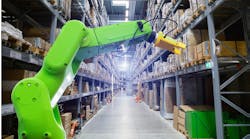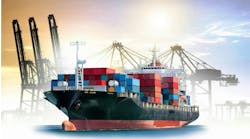Whenever something happens I get a call. A flood in Thailand, I get a call. A threatened dock worker strike on the West Coast, I get a call. A news report that the seasonal flu is spreading faster than usual, I get a call. The initial questions are always the same and fall into two distinct categories: “Do we know what is going on?” and “How will this affect our supply chain?”
I don’t recall exactly when the role of the transportation executive started to require a minute-by-minute knowledge of unfolding global events, but I suspect that expectations shifted in this direction on 9/11. At that moment in time a new sense of vulnerability entered the national consciousness and translated into an immediate thirst for answers and reassurance.
9/11 was followed by SARS and questions about disease transmission on the surface of packages shipped from overseas. Icelandic volcano eruptions brought inquires on flight restrictions and European travel safety. Typhoons in Southeast Asia triggered concerns about port availability and ocean cargo delays, as did the tsunami of 2004. Customer fears of an avian flu pandemic brought discussions with a government epidemiologist for answers on the likely availability of fuel stations during the various stages of an outbreak. The Japan earthquake and tsunami of 2011 triggered immediate concerns about transportation infrastructure, and the Fukushima nuclear power plant disaster created urgent and worried questions about the possibility of radiation exposure on packages coming from Japan. Today, world events are taking place center stage, amplified by 24-hour news coverage and distributed to us instantly via smart phones, computer news feeds, talk radio, television and social media. Cumulatively, this has sensitized everyone to how quickly supply chains can be interrupted.
In the past, it was easy to take the transportation system for granted. Sure, there were temporary service interruptions, but there always seemed to be an acceptable workaround. Globalization has changed that and permeated just about everything we do as a society—and with it has come a general awareness of the key role it plays in our lives. People understand, or at least sense, the interdependencies and complexity of the flow of products around the world and realize how quickly that flow can be disrupted.
The transportation management job is continuing to evolve and is assuming a consultative and advisory role on world events. There is an expectation that because we are responsible for the movement of product around the world that we can see the correlation of world events in the context of the supply chain and anticipate the associated cascading consequences. And the simple fact is that we should be able to do this and communicate it to our management teams, customers and colleagues in a timely and actionable manner.
Surprises are inevitable; but most global events have a developmental lead time in which there is ample warning that something bad is about to happen. A week before Super Storm Sandy hit the East Coast there was extensive reporting on the build-up of the storm. International hostilities don’t explode overnight, but build up pressure over time. Labor disputes usually follow bargaining cycles, and threats of strike are often reported well in advance of their occurrence. Paying attention to current events and following them as they develop is sufficient to connect the dots in most circumstances. For the balance of the issues, a reasonable level of risk management planning will allow you to do ‘what if’ scenario planning and be prepare to deal with the next interruption to the supply chain.
If you do this well, you will be a valuable resource to your organization, your customers and your industry peers.







